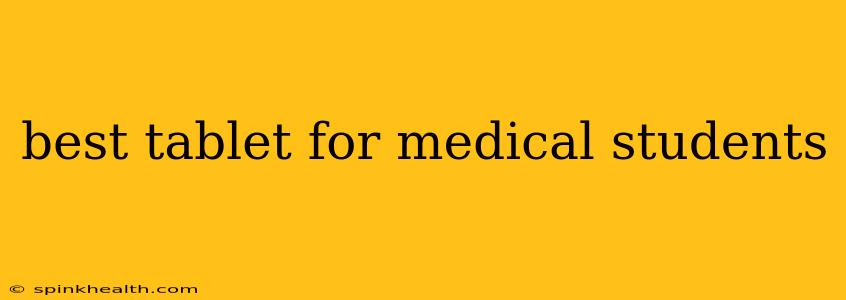The Best Tablet for Medical Students: A Journey Through Anatomy, Physiology, and the Perfect Device
The life of a medical student is a whirlwind of lectures, labs, and late-night study sessions. Carrying around heavy textbooks feels like a Herculean task, and let's face it, trying to balance a mountain of papers and a steaming mug of coffee while cramming for an exam is a recipe for disaster. This is where the right tablet steps in, transforming from a simple device into a powerful, portable study companion. But with so many options on the market, finding the best tablet for medical students can feel overwhelming. Let's embark on this journey together and explore what truly makes a tablet perfect for this demanding field.
My name is Dr. Emily Carter, and for the past decade, I’ve worked as a physician and educator. I understand the unique challenges faced by medical students, and I've seen firsthand the incredible impact technology can have on their success. This guide is based on my experience and countless conversations with students.
What Makes a Tablet Ideal for Medical Students?
Before diving into specific models, let's define the key features that make a tablet truly exceptional for medical school:
- Portability: You'll be moving between lectures, libraries, hospitals, and potentially even rotations across different locations. A lightweight, easily-transportable tablet is essential.
- Long Battery Life: Let's be honest, nobody wants their tablet to die mid-anatomy quiz. A long-lasting battery is crucial for all-day use.
- Powerful Processor: Medical apps, especially those with complex 3D models or interactive simulations, can be demanding. A robust processor ensures smooth performance.
- Large, High-Resolution Screen: Reading dense medical texts and studying detailed anatomical diagrams requires a large, crisp display to avoid eye strain.
- Storage Capacity: Downloadable textbooks, medical journals, and high-resolution images quickly consume storage space. Ample storage is a must.
- Note-Taking Capabilities: Being able to annotate PDFs, take handwritten notes, and seamlessly integrate your digital learning materials is invaluable.
- Durability: A tablet that can withstand the occasional bump or drop in a bustling hospital environment is a significant advantage.
iPad Pro vs. Samsung Galaxy Tab S8 Ultra: A Tale of Two Titans
Two tablets often top the list for medical students: the iPad Pro and the Samsung Galaxy Tab S8 Ultra. Both offer impressive features, but cater to slightly different preferences.
The iPad Pro boasts a seamless ecosystem integrated with other Apple devices, excellent note-taking capabilities with Apple Pencil, and a robust app store filled with medical-specific apps. Its elegant design and user-friendly interface are appealing to many.
The Samsung Galaxy Tab S8 Ultra, on the other hand, often wins on screen size and multitasking capabilities. The expansive display is perfect for viewing multiple textbooks or research papers simultaneously. Its S Pen stylus offers a natural writing experience, and its powerful processor handles demanding medical applications with ease.
What about other features?
Which operating system is better for medical students? Both iOS and Android have a wide selection of medical apps. The choice often comes down to personal preference and existing device ecosystems.
How much storage do I need? Aim for at least 256GB, especially if you plan to store many textbooks and high-resolution anatomical images. Consider a larger capacity if your budget allows.
Is a keyboard necessary? While not strictly necessary, a keyboard can significantly improve your efficiency for writing essays, taking notes, or completing assignments.
Beyond the Tech: Maximizing Your Tablet's Potential
Investing in the right tablet is only half the battle. To truly unlock its power, consider these strategies:
- Organize your digital library: Utilize apps like GoodNotes, Notability, or OneNote to manage your notes and documents effectively.
- Explore medical-specific apps: Many apps offer interactive anatomy models, medical dictionaries, and clinical decision support tools. Research and find the apps that best suit your learning style.
- Integrate your tablet with other learning resources: Combine your tablet with other study tools, such as flashcards or online courses, for a holistic learning experience.
Choosing the best tablet is a personal decision. By carefully considering your specific needs and preferences, you can find the perfect digital companion to navigate the challenging yet rewarding journey of medical school. Good luck with your studies!

